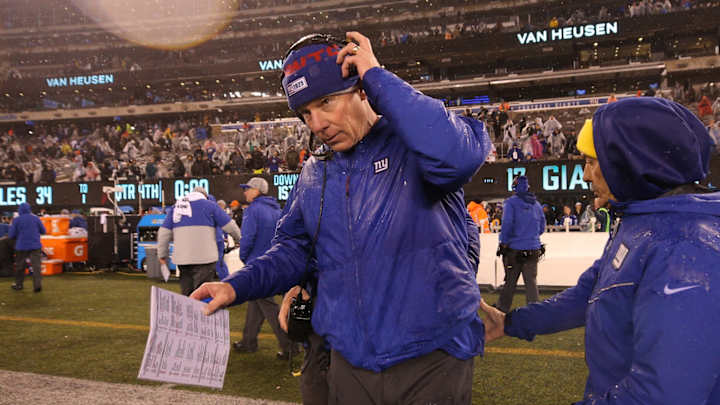Shurmur: Giants Locker Room is in Better Shape Now Than How He Found It

If Sunday’s 34-17 loss to the Philadelphia Eagles was indeed Giants head coach Pat Shurmur’s final game at the helm, he believes the franchise, despite its 4-12 record, is better off now than when he was first hired on January 22, 2018.
“I think so, I do,” he said when asked if the team is in better shape now than it was when he first came in.
“These guys battled. We can talk about the dynamics of how the team was built and where it’s going. We’re building a team. A lot of dead money this year, a lot of cap space next year, and some prime picks where we can use the draft wisely and make decisions on making this team better with impact players.
“You need to have a quarterback, you need to be able to play defense, and you need to run the ball. On defense, you need to have impact players that, when the game is on the line, can do things. We have some strung throughout this roster, and we’ll have a chance to get more. I think that’s exciting.”
If taking some credit for the Giants rebuild project, which is probably not progressing as quickly as anyone in the organization probably would like, is going to help Shurmur sleep Sunday night as he awaits word about his future, then so be it.
But the bottom line is that the salary cap and personnel selection isn’t his jurisdiction—that’s all on general manager Dave Gettleman.
Shurmur’s job--and the jobs of his coaching staff--have always been to develop players and get them ready to play.
While some of those players have indeed made progress—point to quarterback Daniel Jones, receiver Darius Slayton, defensive back Julian Love and defensive lineman Dexter Lawrence II as rookies whose first NFL seasons have the arrow pointed upward—there are just as many players who didn’t develop as hoped either because of the coaching they received from their position coaches or because they weren’t necessarily put in the right positions to be successful (see Corey Ballentine at slot cornerback as an example.
That’s on Shurmur and his staff, and it was interesting that on Monday when he was asked about having had to play so many young players, he said, “I think that the guys that are in there playing are all improving. I say it this way, and it’s really the case:
“They’re having more good plays and less bad plays. I think that the important thing is you get experience because we all would agree that experience matters. For some of these young guys who on most teams would be backups or maybe practice squad players, they’re front-line guys for us, and this is huge for them to be able to compete as starters.”
There are things that Shurmur did that show progress. For example, he never once lost the locker room, and that right, there is a feather in his cap. He also put a structure in place for the players to bond and grow as teammates, an understated yet essential element.
But all that feel-good stuff probably isn’t going to be enough to save his job when team ownership looks at the miscommunications in the defensive secondary and offensive line that never let up, even late in the season. Ownership probably isn’t going to see progress through the continued struggles of some of the rookie players or the failure of some of the second-year players to take the steps forward that many expected of them.
“This is a ‘wins’ business—I get it,” Shurmur said. “We’ve been talking about this for, I think, about six weeks. You’ve been asking me the same questions for six weeks. That’s the reality of this business.”
And at the end of the day when Mara and Tisch lay down what their definition of progress is, it’s hard to imagine that a 9-23 record over two seasons (including a 4-12 mark this year which is one less win than a year ago) will be viewed as Shurmur having left the franchise in better shape than he found it.

Patricia Traina has covered the New York Giants for 30+ seasons, and her work has appeared in multiple media outlets, including The Athletic, Forbes, Bleacher Report, and the Sports Illustrated media group. As a credentialed New York Giants press corps member, Patricia has also covered five Super Bowls (three featuring the Giants), the annual NFL draft, and the NFL Scouting Combine. She is the author of The Big 50: The Men and Moments that Made the New York Giants. In addition to her work with New York Giants On SI, Patricia hosts the Locked On Giants podcast. Patricia is also a member of the Pro Football Writers of America and the Football Writers Association of America.
Follow Patricia_Traina